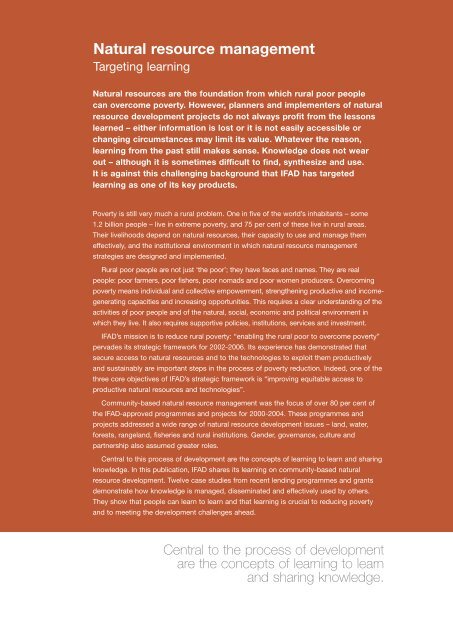Community-based natural resource management - International ...
Community-based natural resource management - International ...
Community-based natural resource management - International ...
You also want an ePaper? Increase the reach of your titles
YUMPU automatically turns print PDFs into web optimized ePapers that Google loves.
Natural <strong>resource</strong> <strong>management</strong><br />
Targeting learning<br />
Natural <strong>resource</strong>s are the foundation from which rural poor people<br />
can overcome poverty. However, planners and implementers of <strong>natural</strong><br />
<strong>resource</strong> development projects do not always profit from the lessons<br />
learned – either information is lost or it is not easily accessible or<br />
changing circumstances may limit its value. Whatever the reason,<br />
learning from the past still makes sense. Knowledge does not wear<br />
out – although it is sometimes difficult to find, synthesize and use.<br />
It is against this challenging background that IFAD has targeted<br />
learning as one of its key products.<br />
Poverty is still very much a rural problem. One in five of the world’s inhabitants – some<br />
1.2 billion people – live in extreme poverty, and 75 per cent of these live in rural areas.<br />
Their livelihoods depend on <strong>natural</strong> <strong>resource</strong>s, their capacity to use and manage them<br />
effectively, and the institutional environment in which <strong>natural</strong> <strong>resource</strong> <strong>management</strong><br />
strategies are designed and implemented.<br />
Rural poor people are not just ‘the poor’; they have faces and names. They are real<br />
people: poor farmers, poor fishers, poor nomads and poor women producers. Overcoming<br />
poverty means individual and collective empowerment, strengthening productive and incomegenerating<br />
capacities and increasing opportunities. This requires a clear understanding of the<br />
activities of poor people and of the <strong>natural</strong>, social, economic and political environment in<br />
which they live. It also requires supportive policies, institutions, services and investment.<br />
IFAD’s mission is to reduce rural poverty: “enabling the rural poor to overcome poverty”<br />
pervades its strategic framework for 2002-2006. Its experience has demonstrated that<br />
secure access to <strong>natural</strong> <strong>resource</strong>s and to the technologies to exploit them productively<br />
and sustainably are important steps in the process of poverty reduction. Indeed, one of the<br />
three core objectives of IFAD’s strategic framework is “improving equitable access to<br />
productive <strong>natural</strong> <strong>resource</strong>s and technologies”.<br />
<strong>Community</strong>-<strong>based</strong> <strong>natural</strong> <strong>resource</strong> <strong>management</strong> was the focus of over 80 per cent of<br />
the IFAD-approved programmes and projects for 2000-2004. These programmes and<br />
projects addressed a wide range of <strong>natural</strong> <strong>resource</strong> development issues – land, water,<br />
forests, rangeland, fisheries and rural institutions. Gender, governance, culture and<br />
partnership also assumed greater roles.<br />
Central to this process of development are the concepts of learning to learn and sharing<br />
knowledge. In this publication, IFAD shares its learning on community-<strong>based</strong> <strong>natural</strong><br />
<strong>resource</strong> development. Twelve case studies from recent lending programmes and grants<br />
demonstrate how knowledge is managed, disseminated and effectively used by others.<br />
They show that people can learn to learn and that learning is crucial to reducing poverty<br />
and to meeting the development challenges ahead.<br />
Central to the process of development<br />
are the concepts of learning to learn<br />
and sharing knowledge.

















